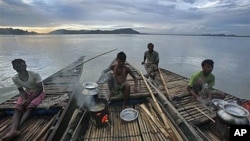India's government says it is not concerned that China will divert or reduce the flow from a major river it shares with India. That assessment comes in large part from Indian surveillance satellites deployed over Chinese territory, which are said to have world-class capabilities.
Indian government sources say "extremely high caliber" satellite technology is able to produce "superb" imagery of what China is doing just over its northeastern border. Primarily for that reason, the sources said New Delhi has no concerns whatsoever at this time that China is seeking to curb the flow of a major river that flows into India from Chinese-controlled Tibet.
India's External Affairs Minister S.M. Krishna hosted the chief minister of India's northeastern Assam state, Tarun Gogoi, in New Delhi on Thursday. Gogoi had publicly expressed concern over renewed media speculation that a dam China is constructing upstream along a shared river would result in reduced water flows. India's Brahmaputra river, known in China as the Yarlung Tsangpo, is a lifeline that provides irrigation and hydroelectric power for several Indian states and Bangladesh.
Minister Krishna said assurances from China, along with information that India is able to verify on its own, indicate the planned Chinese dam project poses no threat to India's river access.
"The question of diversion, or the question of any storage of water, doesn't arise," said Krishna.
China and India describe the Chinese dam as a run-of-the-river hydroelectric project that does not actually block the river's flow, but instead uses the natural flow of the river to generate energy.
Gogoi emerged from his meeting with Krishna apparently reassured. "I am convinced there is no shortage of water... since there is no diversion of water, there is no cause for worry," said Gogoi.
No formal agreement exists between India and China for the sharing of water from the Brahmaputra river. However, Indian government sources say the two countries, in their words, "discuss what we need to discuss" via working groups on water that meet frequently.
One of the Indian states served by the river, Arunachal Pradesh, is not formally recognized by Beijing as part of India. It shows up on Chinese maps as "Southern Tibet." For that and other reasons, issues regarding India's Himalayan border with China come with an inherent, if minor, element of tension.
Indian government sources say they will continue to monitor Chinese activity along the Brahmaputra using satellite capabilities, which have dramatically improved over the past two years. Those same capabilities, the sources point out, also allow India to keep an eye on China's military deployments along the border.
Indian Satellites Confirm China Not Diverting River
- By Kurt Achin










